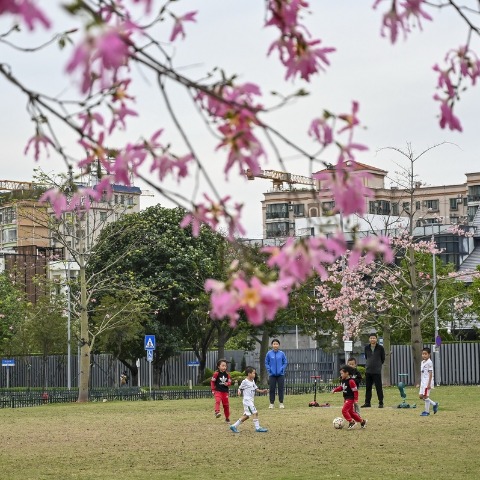



Measures being fine-tuned to speed up orderly return to normal life, production
China's COVID-19 prevention and control work is facing a new situation and new tasks, with the weakening pathogenicity of Omicron, increasing uptake of vaccinations and growing disease response experiences, Vice-Premier Sun Chunlan said recently.
To speed up an orderly return to normal lives and production, some regions hit by the virus have begun fine-tuning their measures, such as lifting temporary control orders, waiving regular testing requirements for certain groups and allowing close contacts of confirmed patients to self-isolate at home.
During a meeting with top public health and medical experts in Beijing on Wednesday, Sun said China will "take small steps" to further upgrade its virus control policy and "keep moving", as well as continue improving its diagnostics, testing, treatment and quarantine measures.
She also stressed boosting mass immunization, especially among the elderly, accelerating preparations of drugs and medical resources, while ensuring a balance between disease control work and social and economic development.
Sun said that China has always put the safety and health of its people first during its three-year fight against the virus. Over the course, the country has released nine versions of disease prevention and control protocols and published a package of 20 modified measures, in accordance with the latest epidemic circumstances.
Its steady but agile action has effectively tackled uncertainties of the epidemic, she added.
A hallmark of the latest pandemic situation is that the dominant strain of Omicron and its subvariants are highly transmissible, but less virulent and less likely to cause severe diseases or deaths compared with the original novel coronavirus and previous key variants, according to experts.
"The diminished virulence of Omicron results from the changing nature of the virus, as well as expanding immunization across the population and timely provision of treatment," said Chang Zhaorui, a researcher with the Chinese Center for Disease Control and Prevention, on Tuesday.
By Monday, the mainland had fully vaccinated just over 90 percent of its population, according to the National Health Commission.
The public's health awareness and knowledge have also improved significantly, Sun said during another symposium on Thursday with grassroots disease control workers.
Sun added that China has now gained effective diagnosis and treatment tools, drugs and traditional Chinese medications, creating more favorable conditions for further upgrading disease control policies.
She said enhancing triage systems at community medical centers, strengthening grassroots disease control and stepping up care for residents facing difficulties in their basic livelihoods and healthcare are required.
The mainland reported 4,080 confirmed local confirmed cases and 31,720 asymptomatic carriers on Wednesday, according to the commission.
On Wednesday, several districts in Guangzhou, Guangdong province, which had been reporting the bulk of new infections nationally, announced they were removing temporary restrictions imposed on certain areas and would only lock down areas deemed as high risk.
Zhang Yi, deputy director of the city's health commission, said during a news conference that close contacts of confirmed cases will be allowed to quarantine at home, instead of in a centralized facility, if home-based isolation requirements are met.
Li Pan, a health official in Chongqing in Southwest China, said on Wednesday that close contacts who are elderly, pregnant or breastfeeding and those with serious underlying illnesses can apply to isolate at home. But they should ensure a separate room and avoid contact with remaining family members.
The city government clarified that the scope of close contacts should not be arbitrarily expanded, and "space-time companions" — a term describing people whose movement likely overlapped with confirmed patients — should not be recklessly identified as close contacts.
Starting on Wednesday, the municipality of Beijing will no longer require seniors who rarely leave home, residents who work from home, students taking lessons online, infants and people who don't plan to engage in social activities to take regular nucleic acid tests.
If you have any problems with this article, please contact us at app@chinadaily.com.cn and we'll immediately get back to you.